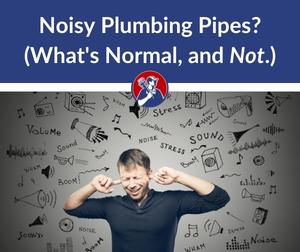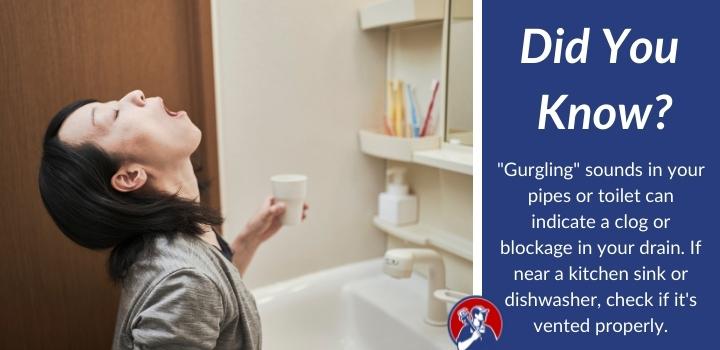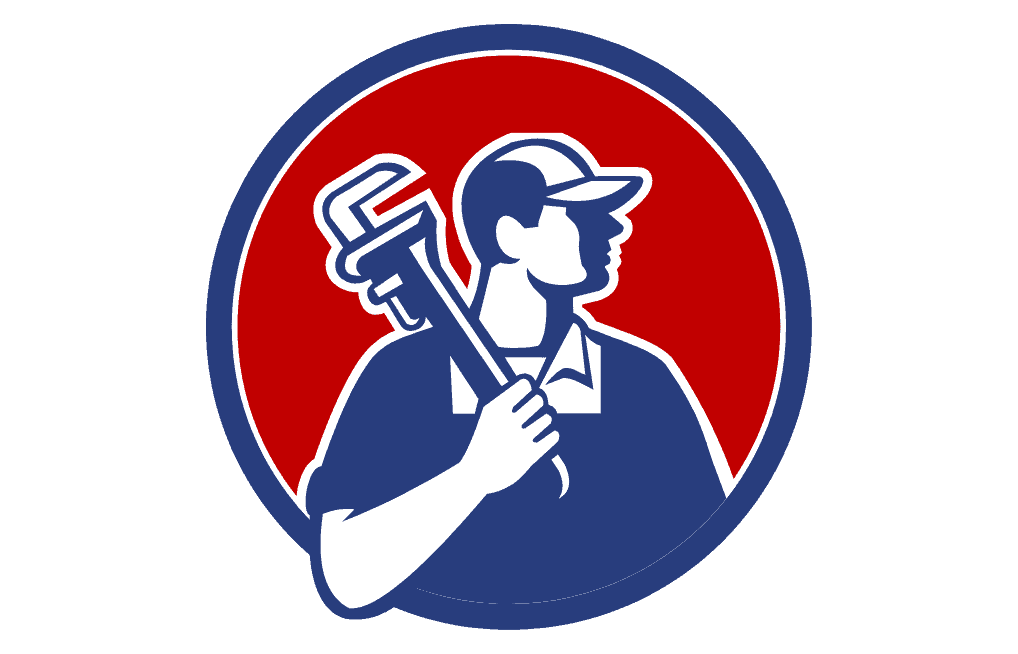
Do you hear odd sounds coming from your bathroom, kitchen, or inside your wall when the water’s running? Don’t panic. It’s not the sound of your house groaning and probably not a ghost.
Rather, the noises you hear may very well be your home’s water pipes. Your plumbing pipes making noises can’t be good, right? While often not an emergency, they still require attention. Let’s discuss the types of noises your plumbing pipes make and how to address them.
In this PlumbingNav guide, we will cover:
- Why plumbing pipes make noises
- Common noises plumbing pipes make explained
- How do you stop water pipes from making noise?
| What's In This Guide? | |
|---|---|
|
|
|
Get Fast, Local Plumbing Service
Connect with an expert plumber in your local area to tackle any job – big or small. Find help with leaks, clogs, or full installations.
Select your service category on the form, provide your details, and an expert plumber will be in touch!
Plumbing Navigator is an informational site that connects visitors with local plumbers but does not directly provide plumbing services or operate as a licensed company.
Why Plumbing Pipes Make Noises
Pipes make strange noises for a number of different reasons. You may be able to narrow in on the cause of your noisy pipe by examining the specific sound while also considering the condition of your plumbing.
We detail the different and most common plumbing noises in this article. Here is a great video as well to help you get a quick overview.
Why is My Plumbing Making Noises (Video)
Common Noises Plumbing Pipes Make: Explained
Why Do Plumbing Pipes Knock and Bang
When pipes knock, the culprit is usually hydraulic shock (colloquially known as a water hammering).
Appropriately enough, the banging noise you hear is similar to an actual knock. Hydraulic shock occurs when you shut off a fixture quickly, closing the valve before the water can escape. As the remaining water in the pipe comes into contact with the closed valve, it creates a knocking noise.
This is because the water flowing through the pipes stops suddenly. (Think of it like slamming on the brakes.) There are devices called hammer or shock arresters that can be installed.
Why Do Plumbing Pipes Whistle and Squeal?
If you hear a sound similar to a whistle or a squeal, it often means that a washer or rubber O ring became damaged or loose. This will require replacement.
Washers are used commonly throughout your plumbing system. Most commonly, the sound comes from your dishwasher or washing machine when it’s running. Hot water temperatures can cause faster deterioration compared to cold water systems and appliances (just one of the reasons you may want to start washing your clothes in cold water with cold water detergent).
A squealing or whistling noise can also come from a bad washer inside your toilet tank after flushing. The noise may “mask” itself due to the location, making it seem like it’s located elsewhere. However, sometimes it’s located inside the tank.
Finally, a whistling shower can be caused by the following. Mineral deposits can clog the showerhead or valve, restricting the opening to water flow and creating a “squeal” as water passes through. Clogged or bad cartridges or valves might also be the cause of whistling as well.
Why Do Plumbing Pipes Rattle?
Rattling and vibrations, especially coming from the walls, may indicate that the pipes have gotten loose.
Plumbers use fasteners to keep pipes steady inside your walls. Over time, the rattling noise may indicate that the fasteners are no longer effectively keeping the pipes in place. You probably have a loose pipe shaking whenever water flows through it.
If the cause is a loose pipe, you can install additional pipe clamps approximately 3 feet apart to secure the pipe and stop the rattle.
Why Do Plumbing Drain Pipes Gurgle?
Plumbing pipes gurgle when air levels in the plumbing system become unbalanced thanks to improper plumbing ventilation or no standing water in a trap. Gurgling noises also occur on drain pipes with inadequate or no venting.
Read our how-to guide on how to get air out of your water pipes.

Why Do Plumbing Pipes Vibrate and Hum?
When your pipes hum, you’re hearing vibrations caused by excessively high water pressure levels.
You may need to reduce the water pressure by installing a Water Pressure Regulator. Residential water pressure usually ranges from 30 to 80 psi. If your water pressure is too high, you may need to lower it using the regulator.
Water pressure Regulator
Even if you tend to prefer high water pressure, it can cause damage to your plumbing system if the pressure levels cause strain to the pipe material, causing a water leak or more devastating pipe deterioration.
Why Do Plumbing Pipes Groan and Moan?
If you hear a groaning sound like a foghorn coming from your pipes, you may find yourself a bit perplexed.
The sound is rather general, so it’s much harder to determine the cause.
The sound is less distinct and more mysterious since it’s generally coming from somewhere deep in your home. The sound you’re hearing is most likely the original noise getting transferred through metal or other material that transfers noise easily.
Is it normal for pipes to make pipe noise when turned on?
Since there are so many different plumbing noises and causes, it’s inevitable that many of the sounds will occur when the fixture is on. However, that’s not always the case.
If the noise occurs when the fixture or appliance is on, that may indicate that a component in use during operation may be the culprit. Additionally, the appliance itself may be to blame, whether it be your water heater, dishwasher, or washing machine. If it’s your water heater, see these posts to learn more about popping and whistling noises.
If the noise occurs when the fixture is off, it’s not the components in the fixture or appliance but probably rather the pipes themselves.
How Do You Stop Water Pipes From Making Noise?
Supply pipes are often difficult to access because they are inside your walls, and even in your concrete slab if you live in the South.
If you are only concerned about the noise level, the first thing to do is determine if it’s a problem or an annoyance. Problems should be dealt with, but you might learn to live with the annoyance when considering the cost of the remedy.
You can add insulation to your pipes to stop some of the sounds we discussed from echoing through your home. However, that only masks the problem without truly addressing the cause.
Do your best to determine the cause of the noise and fix the plumbing issue if you want to truly enjoy quiet plumbing.
How to Stop Knocking and Banging in Plumbing Pipes:
Loud plumbing noises due to knocking or banging need attention, for your sanity but also to preserve your pipe’s connections. How do you stop pipes from knocking? You have two options.
First, you can isolate where this is happening and open a hole in the wall to better secure your plumbing pipes. Perhaps a hanger is loose, or the installer altogether forgot one. Add the fasteners required and test before sealing the wall back up. What to use? There are a million options, just find one for your type of pipe and size it right.
Second, you can install a water hammer arrestor or pressure regulator. Here is a video demonstrating this below.
Learn how to use water hammer arrestors in the following clip:
If you’re comfortable installing it, you can buy these devices online, here.
How to Stop Screeching, Squealing, or Whistling Noise in Pipes:
If the squealing noise is due to a faulty fill valve rubber or washer when the toilet flushes, you can often repair these quite easily by replacing that component. If hard water is behind the whistling when you run the shower, you can remove the showerhead and clean it with vinegar. This post discussing how to remove calcium deposits from faucets will carry over some tips.
If this doesn’t work, try changing the diverter valve or cartridge. Sometimes the cost of repairs rival simply buying a new shower head.
How to Fix Gurgling Noises in Your Drain Pipes:
If you hear a gurgle when you use the sink or flush the toilet, this means there is likely a blockage or clog somewhere in your drain pipe. It could be close to the fixture, or further down in the main sewer line. You can try to fix the gurgling noise in the sink yourself in two different ways.
First, if you suspect your toilet has a clog the easiest thing is to plunge it. This will clear basic blockages that might be behind the gurgling noise. You can also do this to unclog a sink drain.
Second, if the gurgle persists try a drain cleaner designed for the main sewer line. These are specially formulated, and you’ll need to put it in at night so it sits in the system. If the sewer clog isn’t serious, this might resolve the problem.
Third, if the pipes are still making a gurgling noise you can run an electric plumbing snake through the line. This can be done from any opening, as well as from the outside of your house depending upon depth.
Still hear gurgling in the pipes? You may have to call a plumber who can perform a sewer line inspection. Also have them check for air vents on exposed drain pipes, like the pipe under the sink or the pipe exposed behind the wall. If not present, adding these will help reduce gurgling pipes.
Special Note: As some gurgling noises, especially near the kitchen sink or dishwasher may be the result of a venting problem, check out this post on how to vent a kitchen sink properly.
Additional Factors for Why Plumbing Pipes Make Noises
We’ve discussed the most common pipe noises you might hear coming from your plumbing system. Now we’re going to lay out some additional “factors” that might contribute to the problem. This might help you further narrow down the cause behind finding your situation.
The Age of Pipes and Appliances
Older pipes, just like our body’s joints and bones, start to creak and make noises as they get older for a variety of reasons. Small amounts of strain throughout the life of your pipes add up to create the noise you hear.
If your pipes are new such as Pex, that tells you that the problem may be due to improper installation or sudden trauma since new pipes don’t have enough time to develop the problems that put stress on old pipes.
Plumbing Maintenance Routine
As a homeowner, you have a responsibility to keep up with regular drain cleaning safe for your pipes and additional plumbing maintenance. If you know in your heart that you have slacked a little bit, despite what you tell your spouse or the insurance company, that may mean you allowed a drain clog, sediment buildup, or corrosion to develop more quickly than it should have.
Pipe Materials
Metal pipe may succumb to corrosion, especially cast iron pipe used on drain lines. Plastic pipe such as CPVC lasts longer and doesn’t experience corrosion, but it may not provide the same strength. This can also lead to more movement, possible damage or slab leaks.
For water supply lines, opt for copper pipes for longevity and strength or pex if you want durability but also wish to save on costs.
Area Climate
If you live in a particularly hot and humid area, be prepared for additional exposure to moisture and standing water, which can promote mold growth and corrosion.
Pipes may also expand and contract if the weather changes drastically, creating noise throughout the process.
Water Hardness
All water contains minerals, but some more than others. The minerals get left behind when hot water evaporates, creating sediment buildup in your pipes. Hard water, meaning water with high levels of minerals, leaves more mineral deposit buildups more quickly than soft water systems.
Want softer water? Try the Aquasure Harmony or one of the many other products available through Amazon!
Location of the Pipe
Is the pipe in your walls, under your sink, or deep and far underground? Pipes will experience different conditions based on where they are located and how they are secured in place.
Get Fast, Local Plumbing Service
Connect with an expert plumber in your local area to tackle any job – big or small. Find help with leaks, clogs, or full installations.
Select your service category on the form, provide your details, and an expert plumber will be in touch!
Plumbing Navigator is an informational site that connects visitors with local plumbers but does not directly provide plumbing services or operate as a licensed company.
FAQ’s: Why Plumbing Pipes Make Noises
Is it normal for pipes to make plumbing noise?
It’s relatively normal to hear noises coming from your pipes from time to time. However, if you hear them get louder and more frequent, the noisy water pipes may indicate a problem that requires attention.
What does it mean when plumbing pipes make noise?
The cause of noisy pipes depends on the noise.
Some of the common noises and their causes include:
- Knock/bang – water hammer
- Whistle/squeal – loose or damaged washer
- Rattle/vibration – loose fasteners
- Hum/vibration – high water pressure levels
- Gurgle – improper plumbing ventilation
What can cause water pipes to vibrate and make noise?
Pipes in your wall stay in place with the help of fasteners. When the fasteners become loose, the pipes can move and cause noise. Alternatively, you may hear humming and vibration due to high-pressure levels inside the pipe.
Meet Your Plumbing Navigator

About Plumbing Navigator
We’re passionate about all things plumbing, and love sharing tips, “how-to”, and reviewing the latest products to help make your project a success!
Learn More Plumbing Tips
Want to tackle more plumbing projects? Check out these helpful guides!






